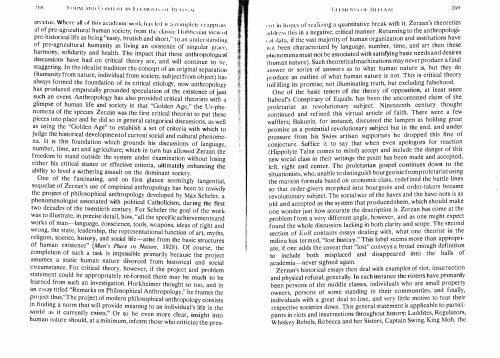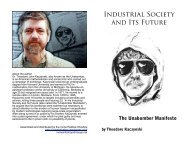CONTENTS - ouroboros ponderosa
CONTENTS - ouroboros ponderosa
CONTENTS - ouroboros ponderosa
Create successful ePaper yourself
Turn your PDF publications into a flip-book with our unique Google optimized e-Paper software.
I'( )HM ANI ) ('()Nrl-NT IN 1, ' 1 I t\-IJ-N I", III II I [1'-. ,'\1<br />
cn;cus, "Vh rc all or Ihis acadelllic work has led is a C( IllIpkll' I'capprili,..;<br />
al at pre-agncultund human socir..:ty; from tbe classic I lohhr.;sian view 01<br />
pre-historieal life as being "nasty, brutish and short," to an understanding<br />
of pre-agncultural<br />
humanity as living an existence of singular grace,<br />
.<br />
harmoy, sohdanty and health. The impact that these anthropological<br />
dIscussIons have had on critical theory are, and will continue to he,<br />
staggen g. In the idealist tradition the concept of an original separation<br />
(humamty from nature, individual from society, subject from object) has<br />
always formed the foundation of its critical etiology, now anthropology<br />
has produced empmcally grounded speculation of the existence of just<br />
such an event. Anthropology has also provided critical theorists with a<br />
ghmpse of human life and society in that "Golden Age," the Ur-phe<br />
n ? men . a of the specIes. Zerzan was the first critical theorist to put these<br />
pIeces Into place and he did so in general categorical discussions as well<br />
as using the "Golden Age" to establish a set of criteria with hich to<br />
judge the historical de elopmentof current social and cultural phenome<br />
na. It IS thIS foundation whIch grounds his discussions of language,<br />
number, tIme, art and agriculture; which in turn has allowed Zerzan the<br />
freedom . to tand outside the system under examination without losing<br />
elther<br />
hIS cntIcal stanc e or effective criteria, ultimately enhancing the<br />
.<br />
.<br />
ablhty to level a WItherIng assault on the dominant society.<br />
One of the fascinating, and on first glance seemingly tangential,<br />
sequelae of Zerzan's use of empirical anthropology has been to revivify<br />
the project of philosophical anthropology developed by Max Scheler a<br />
phenomenologist associated with political Catholicism, during the fist<br />
two decades of the twentieth century. For Scheler the goal of the work<br />
was to illustrate, in precise detail, how, "all the specific achievements and<br />
works of man-language, conscience, tools, weapons, ideas of right and<br />
wrg, the state, leadership, the reprcsentational function of art, myths,<br />
rehglon, SCIence, hIStOry, and social life-arise from the basic structures<br />
of human existence" (Man's Place in Nature, 1928). Of course, the<br />
completJon of ueh a task is impossible primarily because the project<br />
assumes a statIc human nature divorced from historical and social<br />
CIrcumstance. For critical theory, however, if the project and problem<br />
statement could be appropriately re-formed there may be much to be<br />
learned fmm such an investigation. Horkheimer thought so too, and in<br />
an essay titled "Remarks on Philosophical Anthropology," he frames the<br />
pf(Ject thus, "The project of modern philosophical anthropology consists<br />
In hndrng a norm that will pmvide meaning to an individual's life in the<br />
world as it currently exists." Or to be even more clear, insight into<br />
human nature should, at a minimum, inform those who criticize the pres-<br />
1':1 I ·.MI·NTS (11, h!I:H JSAI<br />
elll ill hopes ur realizing a 4uantitativc hreak wjt it. Zerzan's theoreti<br />
:oddrcss this in a negative, critical manner. R turmng to the athropologl<br />






